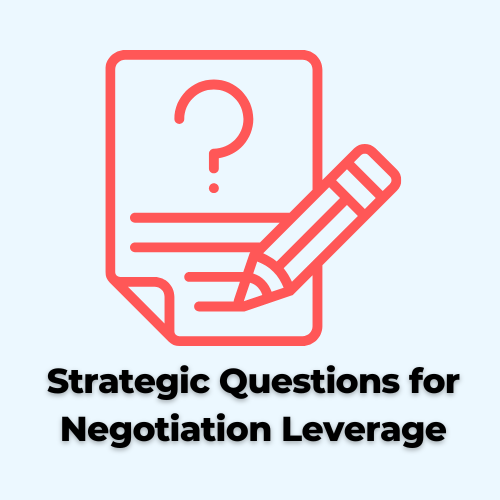Do You Really Need Multiple Job Offers to Negotiate?
At The Salary Negotiator, we’re often asked by clients whether they require multiple job offers before they can successfully negotiate a salary. The short answer? No. We have a 94% success rate in helping job seekers negotiate offers, and we can assure you that most of these clients did not have a second offer on the table.
However, securing an additional offer—or even multiple offers—can help in certain situations. In this article, we highlight how having multiple offers can be helpful during the recruiting process, whether having multiple offers can work against you during the recruiting process, and how to negotiate your offer with or without multiple offers.
Want to Negotiate Your Offer? Get offer-specific guidance from a Salary Negotiation Coach. We help career professionals negotiate competitive job offers.
Or leverage our Salary Negotiation Courses and Salary Negotiation Templates.
 Job Offer Negotiation Course
Job Offer Negotiation Course
- Get our job offer negotiation strategies, templates, scripts, and guidance.
- Access our step-by-step lessons, compensation research guides, and tools.
- Access Now
 Raise Negotiation Course
Raise Negotiation Course
- Get our raise negotiation strategies, templates, scripts, and guidance.
- Access our step-by-step lessons, compensation research guides, and tools.
- Access Now
Having Multiple Job Offers Can Work in Your Favor During the Recruiting Process.
As every seasoned job seeker knows, it’s a good idea to interview with multiple companies and collect a few offers before settling on a role. In doing so, you can learn about what kinds of companies and teams will suit your needs, as well as the type of compensation you can expect within your role type and industry. Having another offer on the table can also help advance interviews in hopes of lining up offers and give you additional leverage during the salary negotiation.
Of course, generating multiple offers is easier said than done—particularly if you’re in a competitive industry and if you’re already working a full-time job, since the job search can be a full-time job in itself.
If you do have multiple offers, disclosing them to a company you’re interested in can be risky if not done correctly. Read on to learn how to navigate this situation and learn how to handle multiple job offers.
Can Receiving Multiple Offers Work Against You During the Recruiting Process?
Many people think that disclosing that they have multiple offers makes them an attractive job candidate, and that this will make the hiring company want them more. But that’s not always the case.
Remember: one of the primary goals of both the hiring manager and recruiter is to fill vacancies quickly, particularly if they need to replace essential team members. As such, they may be less willing to interview or provide an offer to a candidate with multiple job offers. In their eyes, they may assume that the candidate will go with another offer at a different company, so it’s not worth investing their time into that candidate’s recruitment. So, it’s worth thinking carefully about when to disclose information about multiple job offers (if at all).
Don’t Have Another Offer? You Still Have Leverage to Negotiate.
In our experience, most companies will happily negotiate salaries with their chosen candidate—even if they don’t have another offer. While you may be nervous about negotiating, remember the hiring team selected you for the role because they believe you have the right experience and skillset. They want you on their team!
This gives you a lot more leverage than you think. Why?
Because companies incur a lot of time and money recruiting candidates to find the skillset they need. It usually takes weeks or months for companies to find the right fit, especially in specialized tech fields. If you reject the job offer, the organization will have to return to their recruiting efforts and spend even more time and money searching for the right candidate.
Therefore, it’s often more cost-effective to negotiate and boost their chosen candidate’s starting salary if needed. Otherwise, their only option is to leave the hiring manager without their original pick (you!) and start the candidate search over again.
We do suggest you do your diligence by asking questions (step 2 in our salary negotiation process) to build additional leverage before negotiating. You can use our Strategic Questions to Build Negotiation Leverage if you don’t have other offers and want the right questions to ask.

- Build Negotiation Leverage – Ask the right questions to strengthen your negotiation before sending a counter.
- Email & Phone Scripts – Get our list of questions to ask and what to say if the recruiter wants to chat through them.
- Get Here
How to Negotiate a Job Offer without Multiple Offers.
First and most importantly, we recommend that you only start negotiating after receiving a job offer and avoid sharing your salary expectations. Trying to negotiate beforehand could detract from the interview process and cause you to miss out on a potential offer. You always have more leverage once the company has selected you as the right candidate.
Next, we suggest following our five-step strategy for salary negotiations, regardless of whether you have multiple offers. As hundreds of our clients will attest, this process boosts your chances of securing a new role with higher pay. Here’s a quick snapshot:
Understand every component of your offer, including total compensation and benefits.
Gather information from your recruiter.
Research the average pay range for the role you secured.
Send a counteroffer to the recruiter.
Handle any objections and accept the role, knowing you received the best pay possible.
How to Negotiate Your Salary with Multiple Offers.
If you’ve managed to obtain multiple offers, well done! While you should be proud of the exciting opportunities available to you, it’s worth being vague when discussing multiple job offers with rival companies. That way you don’t lose negotiation leverage and know how to handle multiple job offers.
While it’s acceptable to indicate that you’re in demand elsewhere, you must emphasize that you’re interested in working with the company at hand and in the role you’re interviewing for. In doing so, you can avoid jeopardizing your chances of receiving an offer.
It’s also important to note that not all companies negotiate when they see that you received a better offer. If the company knows you have a better offer, they may want to avoid a bidding war with a competitor and decline your request. They may think that if you’re negotiating with them then you’ll probably just take their offer back to the other company to negotiate further. Instead, recruiters will sometimes call your bluff and say the offer “is what it is” because they believe you’ll decline and they need to get back to the recruiting table.
So, when should you share information about other offers during a job offer negotiation?
We recommend only sharing specifics of the other offers when you need to send a second counteroffer in the negotiation. This would occur if they don’t budge after you send the first counteroffer (step 4 in our salary negotiation process) and after handling any objections (step 5 in our salary negotiation process).
Let them know that on top of the compensation data and reasons you shared in your first counteroffer, you did receive an offer for the same position with a more competitive compensation. Just be sure that when you compare both offers on your own, you can verify that they are truly competitive. And again, let the recruiter know that you are still excited about the role and company, but that you are doing your due diligence since you received a higher offer for the same role at another company.
The only time you may need to be more specific about your other job offers is when interviewing with multiple FAANG companies (i.e., Meta, Amazon, Apple, Netflix, and Google) or competing tech companies, such as Microsoft, as they may feel more inclined to match rival offers. However, you should still avoid mentioning specific pay ranges and role levels, and just mentioned that you’re interviewing with that company and don’t share that offer until the second counteroffer as we mentioned above.

- Proven Counteroffer Templates – Built from hundreds of successful job offer negotiations.
- Negotiate with Confidence – Remove the guesswork with our professionally crafted counteroffers.
- Get Here
What If a Recruiter Asks About Other Interviews or Offers?
Sometimes, a recruiter will ask if you have other offers or if you’re interviewing with other companies. This question may catch you off-guard, so it’s worth being prepared with a planned response in advance. That way you know how to tell a recruiter you have another offer without disclosing that information. This may look like:
“Several recruiters and opportunities have come my way recently, but I’m convinced your company—and this role—is right for me. I’m thrilled to have made it this far in the recruitment process and I’m excited about the prospect of receiving an offer.”
If you’re looking to speed up the recruitment process and ensure you don’t leave other companies waiting for a response, you can try something like this:
“As I’ve already mentioned, I’m determined to land this job and transition to your company, as I think this role is a great fit. However, I’ve finished other interview rounds and am starting to receive other offers. While I would prefer not to entertain these offers, I must keep them in mind until I’m certain I’ve made it through your selection process. Is there a way to speed up the interview process? If not, do you know when you’ll be making a final decision? Providing this information will give me the confidence to pass on other offers and channel my energies into working at your company.”
The Bottom Line
All job offers are negotiable, and you don’t require another offer to negotiate your salary. While presenting a potential employer with another offer could help in certain situations, you shouldn’t buy into the myth that multiple offers are necessary for successful salary negotiations.
If you want to guarantee success in your salary negotiation, get Salary Negotiation Coaching from us. Our experience helping career professionals negotiate job offers will ensure you negotiate competitive compensation.
We also have our How to Negotiate a Job Offer and How to Negotiate a Raise courses, and Salary Negotiation Templates for those who want to learn at their own pace and gain the confidence and tools to negotiate their compensation. With downloadable email templates and job offer negotiation resources you will be prepared for all aspects of the salary negotiation.
 Job Offer Negotiation Course
Job Offer Negotiation Course
- Get our job offer negotiation strategies, templates, scripts, and guidance.
- Access our step-by-step lessons, compensation research guides, and tools.
- Access Now
 Raise Negotiation Course
Raise Negotiation Course
- Get our raise negotiation strategies, templates, scripts, and guidance.
- Access our step-by-step lessons, compensation research guides, and tools.
- Access Now

